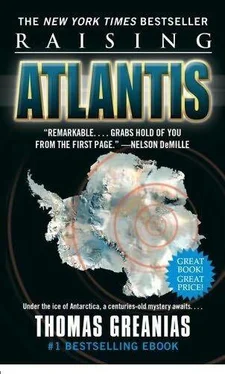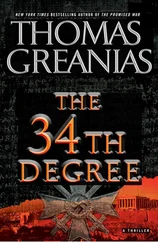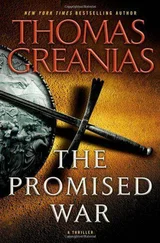“I’m in my seat.” Conrad flicked on the radio switch. A low hum crackled. “You can’t kill me. You need me, Lundstrom. God knows why, but you do. And you better put my gun away. It’s been known to go off accidentally. If this ride gets any bumpier you might miss my head and put a hole through the windshield.”
Lundstrom looked outside at the raging skies. “Damn you, Conrad.”
Conrad leaned over the radio microphone, aware of the barrel of the pistol wavering behind his head as he adjusted the frequency. “What’s our call sign and frequency?”
Lundstrom hesitated. Then a huge jolt almost ejected him out of his seat. Lundstrom lowered the pistol as the turbulence rocked the cockpit. “We’re six-nine-six, Conrad,” Lundstrom shouted, reaching over to adjust the frequency.
Conrad clicked on the radio microphone. “This is six-nine-sixer. Requesting emergency assistance.”
There was no response.
“This is six-nine-sixer,” Conrad repeated. “Requesting emergency assistance.”
Again, no response.
“Look!” shouted the navigator. “Ice Base Orion.”
“Ice Base Orion?” Conrad repeated.
The mist parted for a moment, opening a window onto the wasteland below. A panorama of mountains poked up out of the ice, filling the entire horizon as far as Conrad could see. The flanks of jagged peaks dribbled whipped-cream snow into the bottom of a great valley marked by a black crescent-shaped crack in the ice. Perched on the concave side of the crack was a human settlement of domes, sheds, and towers. Conrad saw it flash by before they were swallowed up by the mist again.
“This is it?” Conrad asked.
Lundstrom nodded. “If only we can find the strip.”
“The strip?” asked Conrad when a thunderous bolt of turbulence almost knocked him out of his chair. If he hadn’t strapped himself in, he realized, his head would now be part of the instrument panel.
“The runway,” Lundstrom explained. “Bulldozed out of the ice.”
“We’re making a white-on-white approach?” Conrad stared at the swirling snow outside the flight deck windshield. Strobe lights and boundary flares were useless against the glare of a whiteout. With the sky overcast, there were no shadows and no horizons. And flying over a uniformly white surface makes it impossible to judge height or distance. Even birds crash into the snow. “You guys are borderline lunatic.”
The radio crackled.
“Six-nine-sixer, this is Tower.” A gruff, monotone voice came in. “Repeat. This is Tower calling six-nine-sixer.”
“This is six-nine-sixer,” said Lundstrom, grabbing the microphone. “Go ahead, Tower.”
The controller on the other end said, “Winds fifteen cross and gusting to forty knots, visibility zero-zero.”
Conrad could tell Lundstrom was doing the math, wondering whether to go for it or go into holding and pray for a miracle.
“Winds shifting to dead cross, gusting to sixty knots, sir,” shouted the navigator.
Conrad grabbed the microphone back. “Trying to land this tin crate on a giant ice cube is suicide and you know it.”
“Search-and-rescue teams standing by,” the controller said. “Over.”
Conrad looked hard into the mist as Lundstrom brought them in. Visibility was nil in the fog and blowing snow. Suddenly the curtain parted again and a row of black steel drums appeared on approach dead ahead. The strip itself was marked in Day-Glo signboards.
“We’re coming in too low,” he said.
“Commence letdown,” Lundstrom ordered.
The copilot gently throttled back, working to keep the props in sync.
The radio popped. “Begin your final descent at the word ‘now,’ ” the controller instructed.
“Copy.”
“You are right on the glide slope.”
“Copy,” said Lundstrom when a nerve-wracking dip shook the plane from front to back. Conrad tightened the straps of his seat harness and held his breath.
“You are now below the glide slope,” the controller warned. “Decrease your rate of descent and steer two degrees left.”
“Copy.” Lundstrom gently tugged the steering column and Conrad could feel the C-141 level off.
“You are now back on the glide slope,” the controller said. “Coming right down the pike at two miles to touchdown…”
Conrad could still see nothing out the windshield but a white wall.
“…right on at one mile to touchdown…
“…right on at one-half mile…
“…one-quarter mile…
“…touchdown.”
Conrad and Lundstrom stared at each other. They were still floating.
“Tower?” repeated Lundstrom.
An eternity of silence followed, then a slamming crunch. The commandos toppled like dominos over one another and then dangled weightlessly from their web-like seats. The tie downs in the rear snapped apart and the cargo shifted forward.
Conrad heard the crack and looked back to see several metal containers fly through the main cabin toward the cockpit. He ducked as something whizzed past his ear and struck Lundstrom in the head, driving the pilot’s skull into the controls.
Conrad reached for the steering column just as the ice pack smashed through the windshield and everything collapsed into darkness.
Discovery Plus Twenty-Three Days, Seven Hours
It was the bleeping sound of the C-141’s homing beacon that finally brought Conrad back to consciousness. He blinked his eyes open to a flurry of snow. Slowly the picture came into focus. Through the broken fuselage he could see pieces of the transport scattered across the ice sheet.
He glanced at Lundstrom. The pilot’s eyes were frozen open in terror, his mouth gaping in a fixed scream. Then Conrad saw a metal shard protruding from Lundstrom’s skull. He must have died on impact.
Conrad swallowed hard and gasped for breath. The Antarctic air seemed to rush inside and freeze his lungs. He felt punchy, light-headed. This is no good, he told himself, no good at all. His internal, core temperature was dropping. Hypothermia was setting in. Soon he’d lose consciousness and his heart would stop unless he took action.
He fumbled for his seat buckle, but his fingers wouldn’t move. He glanced down. His right hand was frozen to the seat. His fingertips were white with frostbite. He knew that meant the blood vessels had contracted and the tissue was slowly dying.
Conrad surveyed the cockpit, trying not to panic. Using his numb but gloved left hand, he grasped a thermos from behind Lundstrom’s corpse. He worked it until the top popped open. Then he poured the hot coffee over his right hand, watching a cloud of steam rise over his sizzling hand as he peeled it away from the chair. He looked at his seared palm. It was bloody red and blistered, but he was too numb with cold to feel any pain.
He dragged himself over to the copilot and put an ear to his lips. He was breathing, just barely. So was the navigator. Conrad could hear a few low groans from the commandos in back.
Conrad reached for the transmitter. “This is six-nine-sixer,” Conrad said breathlessly, leaning over the microphone. “Requesting emergency assistance.”
There was no answer. He adjusted the frequency.
“This is six-nine-sixer, you bastards,” he repeated.
But no matter which frequency he dialed, he was unable to break through. After several minutes of empty hissing, the transmitter finally went dead.
Nobody could hear him, he realized.
Conrad worked his way through the cockpit debris, searching for a backup radio. But he couldn’t find one. Surely they had to have a beacon, an EPIRB signal at the least. But perhaps Lundstrom and his team didn’t want to be found in a case like this.
The only thing he discovered was a single flare, and that from his own pack. A lot of good it would do him.
Читать дальше












